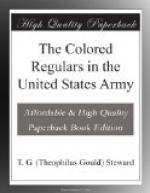night of slavery would end and the dawn of freedom
appear. They often talked to each other of the
progress of the war and conferred in secret as to
what they might do to aid in the struggle. Worn
out with long bondage, yearning for the boon of freedom,
longing for the sun of liberty to rise, they kept
their peace and left the result to God.”
Mr. Douglass, whom this same Bishop Gaines speaks
of very inappropriately as a “half-breed,”
seemed able to grasp the feelings both of the slave
and the freeman and said: “From the first,
I for one, saw in this war the end of slavery, and
truth requires me to say that my interest in the success
of the North was largely due to this belief.”
Mr. Seward, the wise Secretary of State, had thought
that the war would come and go without producing any
change in the relation of master and slave; but the
humble slave on the Georgia cotton plantation, or in
the Carolina rice fields, knew that the booming of
the guns of rebellion in Charleston was the opening
note of the death knell of slavery. The slave
undoubtedly understood the issue, and knew on which
side liberty dwelt. Although thoroughly bred
to slavery, and as contented and happy as he could
be in his lot, he acted according to the injunction
of the Apostle: “Art thou called being
a servant, care not for it; but if thou mayest be
made free, use it rather.” The slaves tried
to be contented, but they preferred freedom and knew
which side to take when the time came for them to
act.
Enough has been said to show that out of the African
slave had been developed a thoroughly American slave,
so well imbued with modern civilization and so well
versed in American politics, as to be partially ready
for citizenship. He had become law-abiding and
order-loving, and possessed of an intelligent desire
to be free. Whether he had within him the necessary
moral elements to become a soldier the pages following
will attempt to make known. He had the numbers,
the physical strength and the intelligence. He
could enter the strife with a sufficient comprehension
of the issues involved to enable him to give to his
own heart a reason for his action. Fitness for
the soldier does not necessarily involve fitness for
citizenship, but the actual discharge of the duties
of the soldier in defence of the nation, entitles
one to all common rights, to the nation’s gratitude,
and to the highest honors for which he is qualified.
In concluding this chapter I shall briefly return
to the free colored people of the South that the reader
may be able to properly estimate their importance
as a separate element. Their influence upon the
slave population was very slight, inasmuch as law
and custom forbade the intercourse of these two classes.




